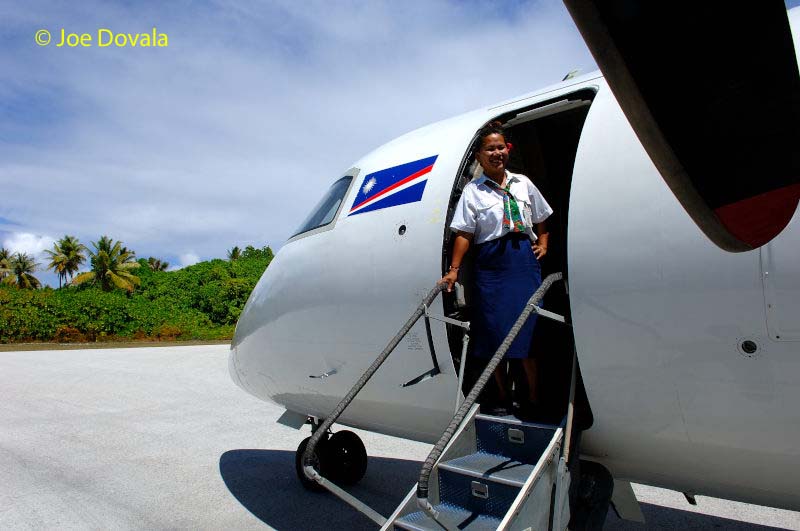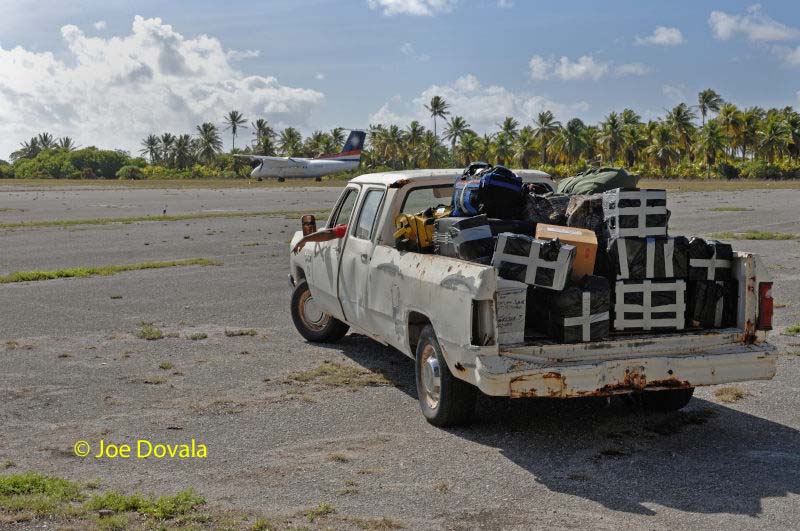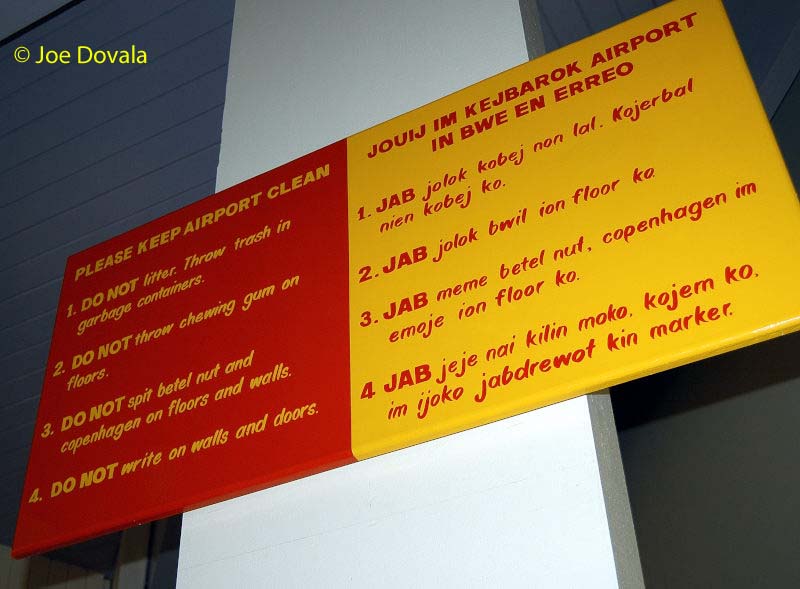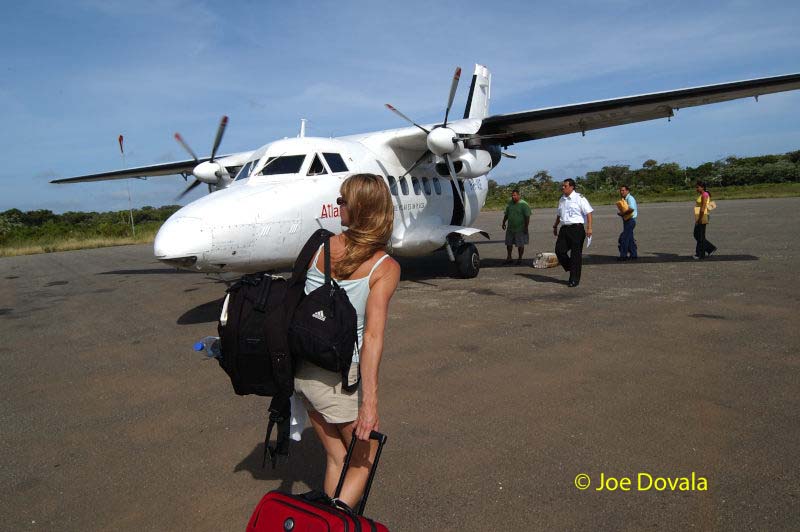The South Pacific heat was already oppressive, but adding 150 new sweating bodies made the overworked ceiling fans useless. My clothes were sticking to me tighter than a Brittney Spears outfit and I could swear the ticket agent just told the woman in front of me “no problem, go ‘head and take da cooler wich you on da plane…..”. OK, now it must be the heat and lack of sleep on my part, because there’s no way the airline would let this lady bring a cooler leaking fish blood on board. As I shuffled my bags up to the counter and before I could even get a “How’s it goin’?” out, I was informed that the plane was overloaded by 2000 pounds and cargo was going to be left behind. I knew the mountainous stack of ice chests weren’t on the hit list so I better come up with something real convincing – and quick.
Words & Photos by Joe Dovala
Sound far fetched? This actually happened. While not every travel portion of a vacation may start this way, something like it can happen especially in the far reaches of the globe. As Americans we seem to have a sense of entitlement and expectations because we’re on vacation. No one else really cares about that and if you try to play those cards you’ll lose every time. It pays to do a little research about the area you will be traveling in, not just the wonderful diving or the hot chocolate chip cookies handed out after getting wet, but the local customs and the people you’ll be dealing with along the way. For instance, seafood is currency in many places and the gift of choice if you’re going to a wedding, so you better pack up the fish or lobster in a sturdy ice box and buy a ticket. What does this mean for you? Well, scores of ice chests can be treated as priority luggage so don’t be too surprised if your gear bag is bumped instead from a flight.
Even though the air carrier may have a familiar name stenciled on the fuselage, the folks who manage and work it are mostly of the local variety, so their method of operation may differ from what you’d expect. Always take reliable phone numbers/email for your travel agent and the carriers you’ll be riding with. Ask for contact information for all legs of the journey. While cell phones aren’t usable everywhere it still pays to take one. Check with your cell service about overseas availability and do expect high roaming and surcharge fees. There are several “unlocked” phones that will work with all providers, which means if a local one exists you’ll be able to use it, often at a fraction of the price of a U.S. purveyor. Another option is satellite phones which have made huge progress in terms of types and costs, and now are a viable option for the vacation traveler. Iridium phones (~ $1,000.00 and up) have true global coverage but must be used outdoors with a relatively clear sky overhead. Although I’ve used one under the eaves of a building, with a driving rain storm, in the middle of the Pacific Ocean, and still was able to communicate fairly well. The costs typically range in the $1.50/min category so they’re probably not something you’ll want to use catching up on small talk.
One of the best contacts to have is a family member or friend who can act on your behalf from home. Make sure they have all the same info you have. Often they’ll be able to correct problems on their end for you while you’re still trying to find a working toilet at your end. Keep in mind however that the proverbial right-hand-doesn’t-know-what-the-left-hand-is-doing scenario is alive and well at any given time with air carriers. This is why it is so important to have contact info for as many airline/hotel people as possible throughout the travel segment of your voyage.
One of the major stressors with air travel today is baggage. The rules seem to keep changing and there appears to be little consistency between airports. Security is the buzzword pretty much everywhere. Surprisingly, I’ve found most out of the way airports to have a less stressed and often more professional (read nicer) approach to it than most U.S. cities I’ve seen. It’s a good idea to keep a few things in mind though. Regardless of how you think it should be done the security employees have their own protocol to follow. In most cases there is little in the way of high technology other than carry on x-ray and a metal detector. And these are often in disrepair. Complete baggage searches are the norm and that means every bag for every person needs to be opened and checked one by one. As you can expect this is very time consuming so the BIGGEST rule is show up plenty early and find out where the inspections occur. Do not assume that airline employees will seek you out to inform you about procedures and timing. You need to take an active role and be responsible for your travel.
Baggage allowances and procedures can be quite different between airlines. Most weight restrictions for trans-Pacific flights are around the 50 pound mark with excess fees above that. Carry on is typical of domestic U. S. flights but some smaller “island hoppers” have no carry-on at all. Every bag is piled into a space behind the last row of seats. It is amazing to me how many travel agents haven’t a clue as to what the various weight limits are throughout the air routes of the packages they sell. The Boeing 737 flight leg may allow significantly more than the final jaunt on a twin prop Dash 8 to your destination. Weight restrictions are carefully watched and bags can be left behind if the plane is overloaded. Make sure to get solid info on baggage requirements for the entire series of flights.
While languages and cultures differ courtesy is universal. The phrase “Ugly American” has been around for some time. While we don’t have a monopoly on being jerks we tend to stand out when it’s in full bloom. The most important thing to pack is a good attitude. I know this is easy to say and I’ve been tested far more than once, but without it your troubles can magnify to most uncomfortable circumstances. I witnessed a fellow countryman, who being quite displeased at needing to have exact change for the departure tax, throw his money at the customs official. Two airport guards materialized out of nowhere and persuaded the gentleman to stay a little longer in their country. He missed our flight. No telling what his final “bill” was. Usually a smile will go along way so be sure to pack plenty.
There are times when you’ll be beyond smiling and your patience has reached an end. This is where having all your ducks in a row make a real difference. Carry more than one credit card with ample limits and notify the issuers you’re out of the country. Payment disputes can often be settled after you return home. Whatever cash you think you’ll need double it. Carry most of your currency in traveler’s checks but keep some cold hard cash (both U.S. and local if necessary) as well. Have all your papers in order and readily available; make copies of everything and store them separate from the originals. Make sure someone you can trust at home has copies as well. Keep all essential items with you such as medicines in properly labeled containers. Avoid large tools or anything resembling a knife in carry-on. And most important, when conflict rears its ugly head be firm but do not argue. Make certain you are in the right. Ask politely for a supervisor.
Oh, and you may be wondering what the outcome was with my over loaded plane? In order to reduce my luggage weight I packed in a military style duffel bag. I smiled at the agent and said, “Mam I’d sure hate for my uniforms to be left behind reporting to my new duty station!” With my close cropped hair I’d figure this might work. Besides I wasn’t really lying just taking liberties with a few words. She smiled back at me and exclaimed “Sir, no problem.” And with that my bag was whisked off to a growing pile of freight that was going no where mighty fast. She handed me my boarding pass and I thought how nice it was that my face mask and dive computer were in my carry on. I figured I could at least borrow/rent the rest of the gear once I arrived. Should’ve used an ice chest. If I lost my cool it would have done absolutely no good for anyone especially me. As it turned out there were a bunch of no shows and the luggage made it after all.
Long distance traveling can be exhausting and frustrating but remember its just part of the dues one pays to see and feel exotic lands. The moral of the story is be as prepared as possible, know the “rules”, wear a smiley hat, and realize that eventually most everything does tend to work out. At the very least you’ll have some good stories for the gang back home.
Words & Photos by Joe Dovala





